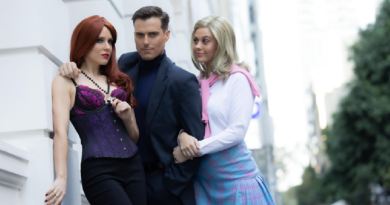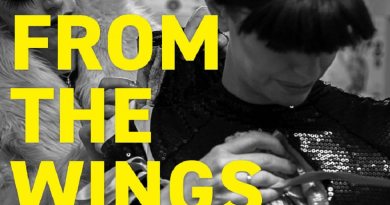Jagged Little Pill: ‘It’s not ironic, y’all!’
For anyone not familiar with Canadian musician Alanis Morissette, cast your eye over the cover of the November 1995 edition of Rolling Stone magazine. The rather innocuous-looking image of Morissette, other than conveying a vaguely indie-cum-grunge vibe, reveals little about her persona. But three loaded words to the left of the photo encapsulate her public image: ‘Angry White Female’.
Given the sales of her groundbreaking 1995 album, Jagged Little Pill, her angsty lyrics clearly resonated with swathes of young people. Morissette came to define a generation, giving an urgent and raw voice to its concerns: contradictory feelings, depression, self-loathing, and failed relationships (‘You told me you’d hold me until you died … you’re still alive’, she bitterly belts out in You Oughta Know) – all feature in Morissette’s oeuvre. So you’d be forgiven for feeling sceptical as to whether an album that spoke so viscerally to a Gen X and Millennial fanbase can communicate anything meaningful to 2022 audiences.
But it can.
And the choice of jukebox musical as a format is a good start. The success of Mamma Mia! at the turn of the centurytriggered a wave of popularity for this theatrical genre, spawning a litany of smash hits, including Jersey Boys and We Will Rock You. Yet Jagged Little Pill, which returns to Sydney on July 9, is no ordinary jukebox musical. When signing over the rights to her songs, Morissette had one caveat: the bio musical angle was off the table. Her story was her story. For the stage, another story must be told. Enter screenwriter Diablo Cody – having penned the lauded Juno, Cody is no stranger to tackling topical, controversial issues. The result is a playbook that is jam-packed with what seems like the whole gamut of today’s pressure points.
The jukebox musical in itself can sometimes be regarded as contrived and lazy, on the basis that a score already exists; a form that cynically feeds an appetite for nostalgia. While it can be argued that Jagged Little Pill does meet this criteria to some extent, Cody’s interpretation of the form is also something of a departure. Not only does it include two new songs penned by Morissette (Smiling and Predator) but the album’s lyrics have been repurposed to fit organically into a story about the underbelly of a modern nuclear family. This repurposing is deployed to humorous effect in one scene, wherein the lyrics of Ironic (which so got under the skin of ‘90s grammar purists) are transformed into a piece of creative writing read out in class – only to be met with the all-too-resonant riposte: ‘It’s not ironic, y’all!’
Then there’s the plot. The scene is one that we all recognise. At least, we recognise the optics: the perfect suburban family, located in Connecticut, an overtly Stepford-style hub of middle-class conformity and affluence. And the concept of image is one that cannot fail to strike a chord with today’s Instagram generation.
But the cracks are there. Beneath the surface, a hotbed of dysfunction simmers. Mary Jane Healy (Natalie Bassingthwaighte) is the matriarch who is secretly hooked on painkillers in the wake of a car accident, while haunted by a past sexual trauma. Lawyer husband Steve (Tim Draxl) is a workaholic, whose penchant for pornography provides an antidote to Mary Jane’s growing detachment. Daughter Frankie (played musical theatre debutante Emily Nkomo) is black, queer and adopted – a heady recipe, almost guaranteed to give rise to themes of activism, rebellion, and identity. As a black girl in a white community, Frankie has two roads open to her: assimilate or rebel. Frankie chooses the latter, which becomes manifest in inflammatory actions such as wearing shorts in winter and addressing her mother by her first name. Maggie McKenna plays Frankie’s friend, Jo, whose sexual orientation is the source of problems at home. Frankie’s brother Nick (Liam Head) is destined for Harvard, and carries the weight of expectation. This anxiety is compounded when Nick is faced with tough choices: friend Bella (Grace Miell) confides that she was raped – and by Nick’s best friend, Andrew (Josh Gates). The Great Implosion ensues.
The political hot potatoes in this placard-wielding musical are many: drug dependency, alienation, gender identity, anxiety and depression, Black Lives Matter – the list goes on. So is this a musical that tries to do too much? Well, if the aim is to hold up a mirror to reality, then probably not: today’s culture is a chaotic slideshow of topical concerns. Spending five minutes flicking through the Netflix menu illustrates the truth of this, punctuated as it is with shows like Heartstopper and Atypical. To address only one issue in Jagged Little Pill is to disregard the melting pot of politicised concerns that the average person encounters, to varying degrees, on a daily basis. The Healy family is simply a microcosm of this modern malaise; current society is Jagged Little Pill writ large. This is not simply a domestic drama, but a global one.
So is it coincidence that Morissette’s most famous album ends with a song called Wake Up? It could easily be interpreted as a prescient call to action, a manifesto urging us all to become what we now designate as ‘woke’. And wake up the world has. We are alert, for example, to the dangers of painkiller addiction, as exemplified by Mary Jane; since 2009 prescriptions for opioids in Australia have increased, along with an average of 150 hospitalisations annually. And according to the Australian Bureau of Statistics , women are five times more likely than men to be victims of sexual assault, a metric painfully illustrated by the experiences of both Mary Jane and Bella. Also lurking is the spectre of mental health conditions: on May 7 School News reported the findings of research carried out by mental health organisation ReachOut, citing an 18 per cent increase in cases since 2020. Nick Healy is clearly not immune to this invisible affliction.
All these issues, and more, are touched upon in Jagged Little Pill. If none take centre stage, it is because we now exist in a world that has no point of stability, an acutely political and ephemeral world – a classic case of art imitating life. And, like life, it’s not all dark; there is humour and joy too.
But don’t expect too much by way of irony – its themes are poignantly literal.




